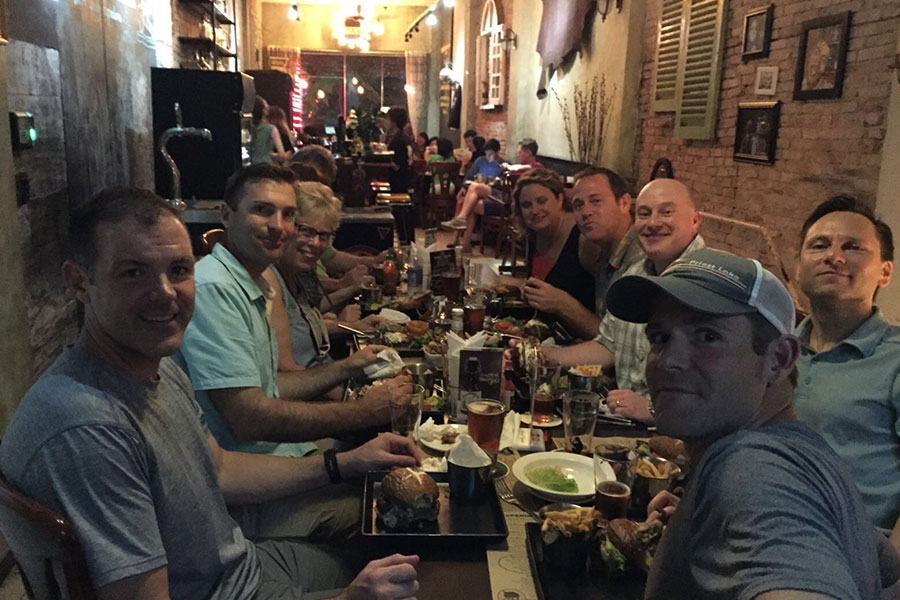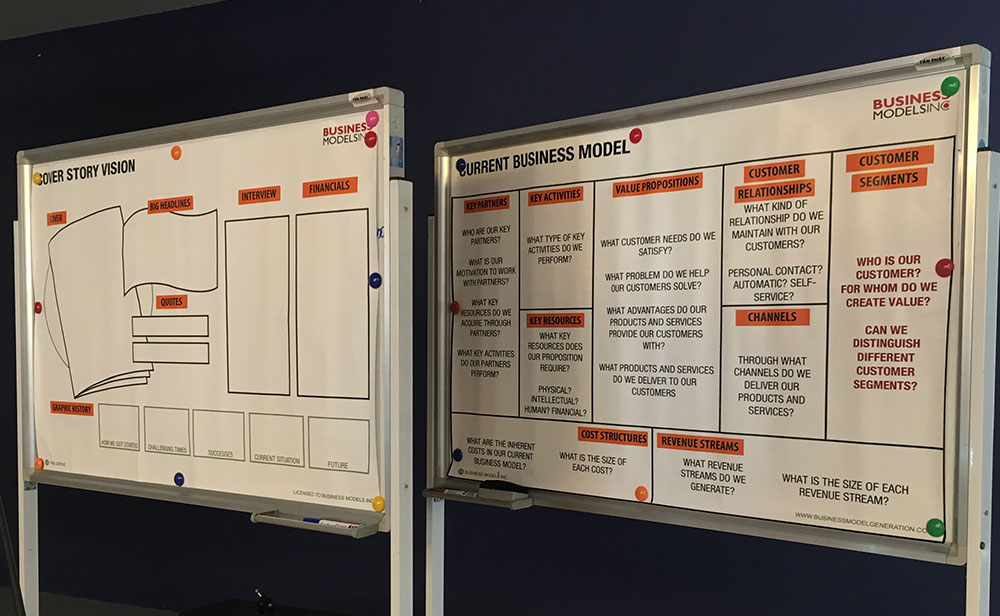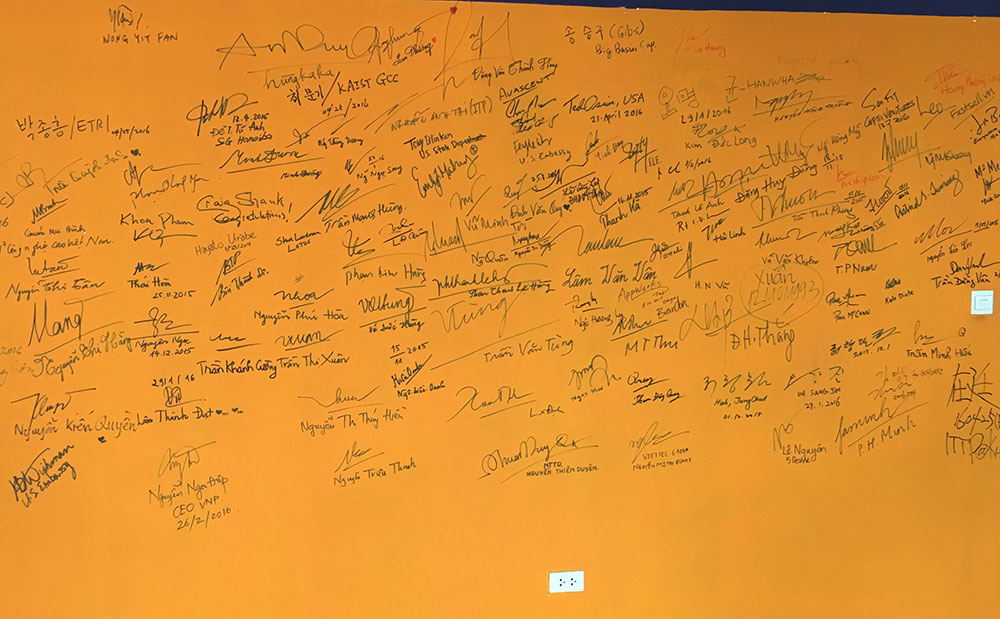EMBA international immersion in Viet Nam: Day 3
Tan Hiep Phat Beverage Group and Vietnam Silicon Valley

We’ve really run the gamut of the type of visits, companies, and business leaders that we’ve met! Everything from very formal with no questions allowed to extremely raw and no question is taboo. At this point we are ready for anything.
We started the day with Tan Hiep Phat Beverage Group. THP is Viet Nam’s leading Fast Moving Consumer Goods (FMCG) company, and operates three of the leading national brands across Viet Nam. THP consistently invests in cutting-edge technology and has three state-of-the-art factories in Viet Nam. They have ten aseptic production lines to ensure the most hygienic, advanced bottling systems in the world.
On the way to the tour, we talked about a recent piece of bad publicity that they received: a consumer supposedly found a fly in their drink. This alleged claim has really hurt their brand, and their sales. We also talked about how we would be meeting with the Deputy CEO, who is not a family member in a family business.
In our meeting, the Deputy CEO was really open about traditional challenges that are faced when working with a family business, and the intentional policies they have implemented to prevent those problems. The business and family are set up as separate charters, which require the leadership to go through the proper channels even though the family lives on the premise. The family members do get warning letters if they do not meet the requirements.
One of the challenges they face is that the Viet Nam education system is lacking, so finding local skilled professionals is a challenge. As a company, they have been proactive with bringing in non-Vietnamese professionals who have the skillsets that the company needs to grow, and so they can build for scale even though there are cultural issues around how to do things locally verses internationally.
We also talked about how they are dealing with the shift in consumer preferences from green tea to water, and how the Vietnamese don’t like cold drinks (they prefer their drinks warm). And he shared a recent failure—a sugar free tea. We were even able to get a sample of it…and yes it was awful! It was also interesting to learn that farmers drink the most energy drinks in Viet Nam, and there are distinct taste preferences in northern Viet Nam’s preference for tart verses southern Viet Nam’s preference for sweet. In new developing markets, they know there is potential for growth, but the challenge is in who to trust
 After lunch we went to Vietnam Silicon Valley. VSV was created by the Ministry of Science and Technology and the Viet Nam Government to create an ecosystem of innovation and technology commercialization in Viet Nam by combining Vietnamese entrepreneurial spirit and innovative nature with the most successful practices that America has to offer in startup development and mentoring, accelerators, and venture capital funding and investing. Personally, I was most excited about this tour as I own my own business and over the years have worked with startups in various stages. I was interested to see how the startup culture as I had experienced it in the states translated into Vietnamese culture. This is also the only visit that we were going to do where actual Government Officials would be present. So we didn’t know what level of openness we would receive.
After lunch we went to Vietnam Silicon Valley. VSV was created by the Ministry of Science and Technology and the Viet Nam Government to create an ecosystem of innovation and technology commercialization in Viet Nam by combining Vietnamese entrepreneurial spirit and innovative nature with the most successful practices that America has to offer in startup development and mentoring, accelerators, and venture capital funding and investing. Personally, I was most excited about this tour as I own my own business and over the years have worked with startups in various stages. I was interested to see how the startup culture as I had experienced it in the states translated into Vietnamese culture. This is also the only visit that we were going to do where actual Government Officials would be present. So we didn’t know what level of openness we would receive.
When this project was created, the government started off telling the VSV that “it’s ok to fail.” Knowing how important face is in this culture, I do question whether that was believed and how successful they have been in changing the culture. Our meeting focused specifically on the startups themselves, but the overall organization was designed in twofold: teach and encourage the wealthy Vietnamese to invest, and to develop startups with global market appeal.
VSV has multiple co-working spaces throughout the country, giving the startups access to training, networking and community events. Their goal is to build a national online portal to be used as a startup complex. They do need help in gathering data, access to investors, and higher quality training for their startups. Another challenge they face is that the concept of mentorship is not understood in their culture so many of the mentors are trying to consume the startups.

Signature wall at Viet Nam Silicon Valley
Currently, the Viet Nam legal structure is too rigid for the startup culture. Additionally, there are no investment banks in Viet Nam, so there is no way for the startups to get the funds they need. They expect it will take about ten years to make these changes, but even with that VSV has had some success stories.
The other interesting thing to note is that supposedly the government doesn’t take ownership of the startups, they simply own the VSV space. But then we were told that it is the owner of the VSV space that decides what startups are accepted into the program and are given 5-10% ownership of the business.
Guest post by Melanie DePaoli
Speaker | Brand Catalyst, Omicle LLC
Follow Melanie on Twitter: @MelDePaoli
